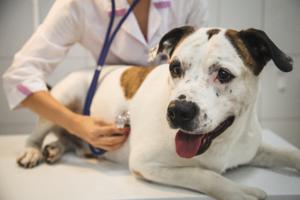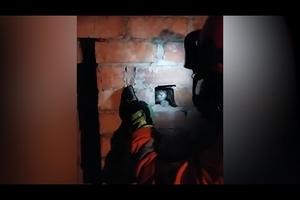Pets
/Home & Leisure

PetSmart contest offers to cover up bad tattoos with a pic of your pooch
Every tattoo has a story. Some are good; others may leave a nagging sense of regret.
Those tattoos that make you cringe are at the heart of a contest that the PetSmart superstore company launched this month.
Dubbed the "Redo Tattoo" contest, PetSmart is offering five winners a chance to replace tattoos they regret with a portrait of a pet.
...Read more
Florida golden retriever gives birth to lime green puppy
(UPI) A golden retriever puppy quickly gained fame online when she was born a color far different from the breed's golden reputation: lime green.
Carole DeBruler, owner of Florida's Golden Treasures Kennel, posted videos of the puppy, named Shamrock, to TikTok, where the cute canine quickly developed a following.
Shamrock was born lime green -...Read more
Escaped dog shuts down traffic in underground tunnel
(UPI) Workers with an Australian toll road operator came to the rescue of a dog that went for a run down a highway tunnel -- and nearly ruined a family wedding.
Transurban, which operates the Legacy Tunnel under the city of Brisbane, shared video showing 13-year-old Maltese mix Hermione running through the tunnel with a slow-speed truck in ...Read more
Missing dog found 17 days after escape at Melbourne Airport
(UPI) A dog who went missing at the Melbourne Airport in Australia was reunited with his owner in Wales after a 17-day search.
The dog, named Milo, had been due to travel home to Swansea, Wales, with owner Jason Whatnall when the canine escaped from the custody of AeroPets Animal Transport.
A 17-day search of the area was launched, and there ...Read more

The AKC offers important tips for your pup’s annual wellness visit
Spring is a great time of year to get your pet’s annual wellness exams done.
These exams are great to see if your pet gained (or lost) any weight over the winter, discuss with your veterinarian the development of any medical or behavioral trends, and focus on keeping your dog as healthy as possible so you and your dog can enjoy the ...Read more

'Little Kitty Big City’ is the mischievous cat video game you’ve always wanted
Matt Wood wants to get inside the mind of cat. That’s the driving force behind his indie project “Little Kitty Big City.” Inspired by his own feline friends, Mario and Roxy, and conceived with help from his children, he crafted a game focused on the nameless, at least initially, feline protagonist who falls from the safety of its window ...Read more

WATCH: Cat rescued from between walls goes viral for 'purr-turbed' expression
(UPI) A cat rescued from between two walls by firefighters in England is going viral on social media thanks to its amused facial expression.
Lancashire Fire and Rescue Service said on social media that crews from Preston responded when the "curious cat" was found trapped between two walls.
"Our firefighters carefully chiseled them out safe and...Read more

Tips on helping your dog relieve spring allergies
Just like humans, dogs can suffer from allergies, and allergy season is in full swing. Common allergens that can affect dogs are things that can be inhaled (like mold, dust mites or pollen), different foods and skin irritants.
To help dog owners manage and help relieve their pup’s allergies, the American Kennel Club offers the following ...Read more

WATCH: Firefighters rescue cat trapped in chimney for two days
(UPI) The London Fire Brigade came to the rescue of a cat who fled from his owner's vacuum and spent two days trapped in the chimney.
The brigade said its Bexley and Greenwich Red Watch crews responded to the Erith-area home to rescue the cat, named Oreo, when his owner started to grow concerned that he wasn't coming down on his own.
"Oreo the...Read more

'Wacky Pet Names' finalists include ChugChug Pickles, Steph Purrrry
(UPI) A pet insurance company is inviting the public to vote on some of the most unusual animal monikers for its annual Wacky Pet Names prize.
Nationwide said the most bizarre names were chosen from the company's currently-enrolled pets and split into three categories: dog, cat and exotic.
The finalists in the dog category are Boots With the ...Read more

Common foods you shouldn't feed your dog and why, according to experts
Some dogs will only eat kibble when it is soaked in gravy. Others must be stopped from eating rocks. Whether Fido is a refined diner or a food fiend, it is the owner's responsibility to make sure their foods are safe. Most know not to treat their pup to chocolate, but other dangers lurk in the most innocent-looking ingredients. Apart from over-...Read more
'Mischievous puppy' rescued from metal trash can lid
(UPI) Firefighters in England came to the rescue of a "mischievous puppy" who poked her head through the hole in the middle of a metal trash can lid and became stuck.
The County Durham & Darlington Fire & Rescue Service said on social media that the 6-month-old Jack Russell terrier, named Amari, put her head through the middle of the ...Read more
Take care of your pup when you’re not there: Tips for your next dog sitter's checklist
When dog owners are away at work or even on vacation, they still make it a priority to make sure that their dog is well cared for while they are away.
The American Kennel Club provides a helpful checklist of everything a dog owner should leave their pet sitter with, so they can have a stress-free time apart.
Maintain the same routine: ...Read more
Your dog will have an anti-aging drug before you do
Before we have an anti-aging drug for humans, we’re likely to have one for dogs. Multiple clinical trials are currently underway to test potential anti-aging compounds on dogs, since our best friends have become a popular animal model for human aging. Fido also represents a potentially huge market.
The science could benefit both species, but...Read more
100 huskies escape dog cafe and run through Chinese mall
(UPI) The dogs had their day at a Chinese mall when 100 huskies escaped from a pet cafe and ran loose through the shopping center.
Workers at the cafe in Shenzhen, Guangdong, said someone left a door open, allowing 100 canines to run out into the shopping mall, surprising and delighting shoppers.
Cafe employees said the dogs were excited ...Read more
Dog missing for nearly a year found more than 2,000 miles from home
(UPI) A dog missing from her owner's California home for nearly a year turned up more than 2,000 miles away in Michigan.
The Grosse Pointe Animal Adoption Society said on social media that the terrier mix was reported wandering loose in Harper Woods by a concerned resident who contacted local police.
Harper Woods Police brought the canine to ...Read more

Former Missouri Proud Boy who wore 'Right Wing Death Squad' cap to Capitol on Jan. 6 found guilty
KANSAS CITY, Mo. — A southeast Missouri man with ties to the Kansas City-area Proud Boys pleaded guilty Wednesday to two felonies involving the Capitol riot and was found guilty by a judge on a third felony count.
Nicholas Kennedy, 43, of Sikeston, entered a guilty plea in U.S. District Court for the District of Columbia to one count of civil...Read more
Could sharing a bedroom with your pets be keeping you from getting a good night’s sleep?
Sleeping with your dog in the same room could be negatively affecting your sleep quality, according to my team’s recently published research in Scientific Reports.
We recruited a nationally representative sample of more than 1,500 American adults who completed questionnaires assessing their sleep habits. Overall, about half of the ...Read more
Angie Harmon's dog fatally shot by Instacart driver: 'We are completely traumatized'
Angie Harmon says she and her daughters are "traumatized beyond measure" after a man delivering groceries from Instacart shot and killed her dog Oliver over the weekend.
The "Law & Order" and "Rizzoli & Isles" alum said she was in her North Carolina home with her children during the incident and is devastated by the loss.
"He got out of his ...Read more
Pet hazards and spring cleaning: The AKC offers tips
It’s inevitable: When the season changes from winter to spring, there’s always spring cleaning (or at least a plan to spring clean). It’s an annual ritual. Unfortunately, many common cleaning products can be dangerous or even deadly to our pets. According to the ASPCA Animal Poison Control Center, exposure to household cleaning products ...Read more
Popular Stories
- Dog digging in Florida yard unearths decades-old military bomb
- PetSmart contest offers to cover up bad tattoos with a pic of your pooch
- Florida golden retriever gives birth to lime green puppy
- Escaped dog shuts down traffic in underground tunnel
- Missing dog found 17 days after escape at Melbourne Airport





